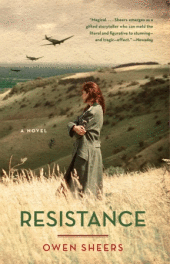 I always knew how Resistance would end before I sat down to write the first word of the story. Not necessarily to the same extent as the author John Irving, who apparently has known, before writing them, the exact syntax and wording of the last sentences of his novels long before he reached them. But I did know what would happen, if not how I was going to get there. My map and compass were both unsure at the start and at times remained so throughout the writing of the novel. My destination, however, was never in doubt.
I always knew how Resistance would end before I sat down to write the first word of the story. Not necessarily to the same extent as the author John Irving, who apparently has known, before writing them, the exact syntax and wording of the last sentences of his novels long before he reached them. But I did know what would happen, if not how I was going to get there. My map and compass were both unsure at the start and at times remained so throughout the writing of the novel. My destination, however, was never in doubt.The story of Resistance was shaped by many influences. The memories of the old men who would have made up Britain's insurgency had the Nazis invaded; the geography, history and myths of the Black Mountains in South Wales, where the novel is set and where I grew up; the need to create an alternative --- but within the covers of the book, a totally believable --- World War II. How the story would end, though, was what decided many of the narrative decisions thrown up by these influences. I know that many writers write a novel allowing the story to take them towards an unknown conclusion and maybe I'll write like that one day too. But somehow I doubt it. To me it makes perfect sense to know the ending of a novel before you begin. Everything in the book is, after all, heading that way. The personal arcs of the characters, the arc of the story and, of course, the reader. For me, it was only by knowing my ending that I could decide when and how certain pieces of information would be released, what prophecies could be made, what clues dropped. This was especially important in Resistance as one of my main motivations in writing the novel was to try and situate or manipulate a reader into a position where they desired the main character, Sarah, to make the objectively "wrong" moral choice. For this to work many intricate and intimate foundations would have to be laid hundreds of pages before she made that choice and a reader, hopefully, found themselves wanting her to go another way....
The other element of the ending of Resistance I knew I wanted was a note of ambiguity. But only that --- a note, a scent, not ambiguity itself. Careful reading of the pages leading up to the ending leave no doubt, I think, as to what happens. Or so I thought. One of the most interesting things to happen at reading groups and book clubs I've attended has been some readers asking for confirmation of what happens at the end of the novel. At first this worried me, but then it turned out that it only took a few questions from me to reveal that nearly all these readers did in fact know what happened. They just hoped that maybe it didn't. One woman hoped this so much that she actually refused to agree with me, insisting I'd got it wrong and that actually what I thought happened at the end of the book, didn't at all! An important reminder of the extent to which, as readers, can we take ownership of a story once it has left the author's hands.
I soon stopped worrying over these questions I encountered at reading groups about the ending of Resistance, mainly because of the discussions we had as a result of them. From those last lines we'd find ourselves ranging back through the rest of the novel looking again at individual characters' actions, at how scenes related to each other, even to the very opening paragraph. And this is exactly what I hope a good ending should do --- turn on a light not previously present in the novel, however subtle, that casts the whole in a slightly different shade, throwing new shadows over known ground. In such a way a single line can minutely re-calibrate your experience of the book you've just spent days and weeks of your life with in such a way that it will resonate in the months to come with even more penetration. I had this experience myself just yesterday when I finished Richard Yates's Revolutionary Road. Now there's a great last line....
---Owen Sheers

